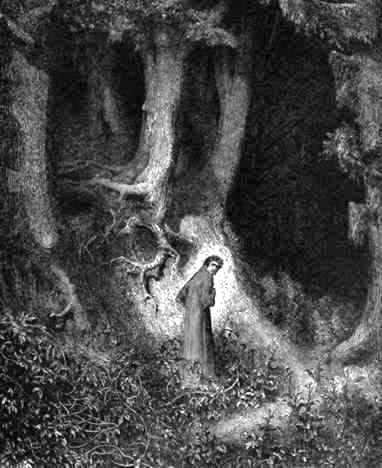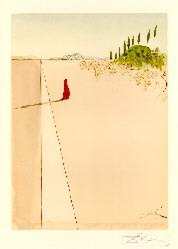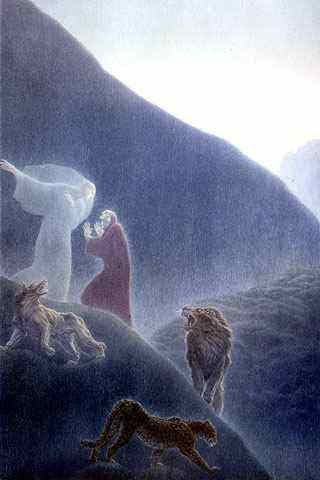 |
 |
 |
|
|
|
|
 |
 |
 |
|
|
|
|
| INF01 |
|
| ........... | ....... G.GUAITA |
.......................... H.W.LONGFELLOW |
...... .D.ALIGHIERI |
....... ... | ....... |
| 1
|
Giüst
a metà dal curs dla nòsa vìta
mi iù truvàmi spèrs 'ntin gran bosc; dop ch' iàva surtì fòra dla vìa drìta. |
Midway
upon the journey of our life I found myself within a forest dark, For the straightforward pathway had been lost.
Ah me! how hard a thing it is to say
So bitter is it, death is little more; |
Nel
mezzo del cammin di nostra vita m ritrovai per una selva oscura, ché la diritta via era smarrita. |
| 4
|
Oh
mè che a dì 'mè l’éra lu trov
düra, cul bosc tüt pién d’arvëj e scüri fort che mèc pensèi am büta ancù pagüra. |
Ah
quanto a dir qual'era è cosa dura questa selva selvaggia e aspra e forte che nel pensier rinnova la paura! |
|
| 7
|
Màru
l’è trop, ancù püsè che mort;
ma par parlè dal bén che iù truvài, a tratè di àuti ròbi am farù fort. |
Tant'è
amara che poco è più morte; ma per trattar del ben ch'io vi trovai, dirò de l'altre cose ch'io v'ho scorte. |
|
| 10
|
Dìvi
i su nén mè l'è che i son entrà,
a iàva tànta sogn an cul mumént che ‘m vis pü nén quànd iù pardì la strà. |
I
cannot well repeat how there I entered, So full was I of slumber at the moment In which I had abandoned the true way.
But after I had reached a mountain's foot,
Upward I looked, and I beheld its shoulders, |
Io
non so ben ridir com'io v'entrai tant'era pieno di sonno a quel punto che la verace via abbandonai. |
| 13
|
Pö,
dop che ‘d na culìn'a am trov ai pé,
la ‘ndùa la finìva cùla val che ‘m fàva , dla pagüra, al cör a zlà, |
Ma
poi ch'i' fui al pié d'un colle giunto, là dove terminava quella valle che m'avea di paura il cor compunto, |
|
| 16 | vardànd
an àut, iù vist che là sü ‘n sìma
‘s puzàvu già i ràg' di cul pianéta che cun al ciàr an guìda anvèrs la méta. |
guardai
in alto, e vidi le sue spalle vestite già dei raggi del pianeta che mena dritto altrui per ogni calle. |
|
| 19
|
‘Lùra,
l’è ‘n poc chitàmi la pagüra
che tüta nöt an cör l’ éra düràmi quànd i àva stàta an mès a cùla büra. |
Then was the fear a little quieted That in my heart's lake had endured throughout The night, which I had passed so piteously.
And even as he, who, with distressful breath,
So did my soul, that still was fleeing onward, |
Allor
fu la paura un poco queta che nel lago del cor m'era durata la notte ch'io passai con tanta pièta. |
| 22
|
E
tam mè iün che l’è scampà a la mort,
dai òndi dal mar gros zbatü' ‘nsla rìva, as gìra a vardè ‘l mar zbanfànda fort, |
E
come quei che con lena affannata uscito fuor del pelago a la riva, si volge a l'acqua perigliosa e guata, |
|
| 25
|
cuzì
méntre ‘l mè cör ancù ‘l curìva,
a iù giràmi par vardè, lì dréra, cul post che l’éra stat la me galéra, |
così
l'animo mio, ch'ancor fuggiva, si volse a rietro a rimirar lo passo che non lasciò già mai persona viva. |
|
| 28
|
Dop
arpuzà , che i éra mè na stràs,
a iù ‘rpià ‘ndè muntànd par cul dezèrt, fazénd sémp fòrsa ansìma al pé pü bas. |
After my weary body I had rested, The way resumed I on the desert slope, So that the firm foot ever was the lower.
And lo! almost where the ascent began,
And never moved she from before my face, |
Poi ch'èi posato un poco il corpo lasso, ripresi via per la piaggia deserta, sì che 'l pié fermo sempre era 'l più basso. |
| 31
|
'Nti
'n mumént, al prinsìpi dla salìta,
zvèlta, zlansà a i éra na pantéra ca l’àva tüta a màci la so pèl ; |
Ed
ed ecco quasi al cominciar de l'erta, una lonza leggiera e presta molto, che di pel maculato era coverta; |
|
| 34
|
a
gl’ iàva lì davànti pròpi ‘n fàcia,
l’andàva sémp sü e giü lì ‘ndùa l’éra, tant che ia stàva già par girè ‘ndréra |
e
non mi si partìa dinanzi al volto, anzi impediva tanto il mio cammino, ch'i fui per ritornar più volte volto. |
|
| 37
|
Ma
l’éra prëstu ‘ncù , ‘d prìma matìn'a,
e ‘l sul muntàva sü cun cùli stéili che l’àva antùrn a Lü al Creatùr |
The
time was the beginning of the morning, And up the sun was mounting with those stars That with him were, what time the Love Divine
At first in motion set those beauteous things;
The hour of time, and the delicious season; |
Temp'era
dal principio del mattino, e 'l sol montava 'n su con quelle stelle ch'eran con lui quando l'amor divino |
| 40
|
quànd
l’ha fat sòrti ‘l mond cun n’at d’Amùr.
Cuzì ancùra, par mi, sperànsa iéra, par cùla bèstia da la pèl macià, |
mosse
di prima quelle cose belle; sì ch'a bene sperar m'era cagione di quella fera a la gaietta pelle |
|
| 43
|
l’èsi
al matìn di ‘n dì ad primavéra;
nén tant però che nén pagüra am déisa la vìsta , là, impruvìza di ‘n liòn: |
l'ora
del tempo e la dolce stagione: ma non sì che paura non mi desse la vista che m'apparve d'un leone. |
|
| 46
|
lü
pròpi còntra ad mi la zmiàva a vnéisa
an àut la tèsta , düvèrta la bùca che zmiàva a l’ària dì:“A guàj chi ‘m tùca”! |
He
seemed as if against me he were coming With head uplifted, and with ravenous hunger, So that it seemed the air was afraid of him;
And a she-wolf, that with all hungerings
She brought upon me so much heaviness, |
Questi
parea che contra me venesse con la test'alta e con rabbiosa fame, sì che parea che l'aere ne temesse. |
| 49
|
e
di ‘n lüf fümèla, cuzì tant màgra
che t’ai cüntàvi fìn'a i so custìn'i; e tànta gént a l’àva fat mischìn'i; |
Ed
una lupa , che di tutte brame sembiava carca ne la sua magrezza, e molte genti fe' già viver grame, |
|
| 52
|
cùsta
l’ha fàmi vnì na ròba andrén
tant am dàva pagüra la so vìsta che urmàj ad muntè sü 'm santìva nén. |
questa
mi porse tanto di gravezza con la paura ch'uscia di sua vista, ch'io perdei la speranza de l'altezza. |
|
| 55
|
Mè
chi ‘l guadàgna fort e vulantéra, e pö i rìva al mumént che lü 'l dév pèrdi, ai vén da piànzi e sagrinà ‘s dispéra, |
And
as he is who willingly acquires, And the time comes that causes him to lose, Who weeps in all his thoughts and is despondent,
E'en such made me that beast withouten peace,
While I was rushing downward to the lowland, |
E
qual'è quei che volentieri acquista, e giunge 'l tempo che perder lo face, che 'n tutti i suoi pensier piange e s'attrista; |
| 58
|
cuzì
‘m santìva mi, par cùla bèstia
che vnéndmi ‘ncòntra, sémp püsè ‘m pusàva an cul brüt post andùa al sul mancàva. |
tal
mi fece la bestia sanza pace, che, venendomi incontro, a poco a poco mi ripigneva là dove 'l sol tace. |
|
| 61
|
Méntre
che i calàva sémp pü ‘n bas, iù vìstmi lì davànti, an bèl mumént, iün che la stàva cìtu da tant témp. |
Mentre
ch'i rovinava in basso loco, dinanzi a li occhi mi si fu offerto chi per lungo silenzio parea fioco. |
|
| 64
|
E
quànd am vëd adòs s’aparisiòn,
“Oh àbia pietà ‘d mi – a iù criài – che ‘t sìi mèche n’òmbra o n’om dabòn”. |
When
I beheld him in the desert vast, "Have pity on me," unto him I cried, "Whiche'er thou art, or shade or real man!"
He answered me: "Not man; man once I was,
'Sub Julio' was I born, though it was late, |
Quando
vidi costui nel gran diserto, "Miserere di me" gridai a lui, "qual che tu sii, od ombra od omo certo!" |
| 67
|
“
N om , si, iù stàta mi, tant témp luntàn ;
la vìta mi ién dàmi genitùr lumbàrd; a iéru tüti dùj di mantuàn. |
Rispuosemi:"Non
omo, omo già fui, e li parenti miei furon lombardi, mantovani per patria ambedui. |
|
| 70
|
Sut
Césare nasì, fòrse trop tàrdi,
sùta divinità fàusi e büziàrdi, iù vivì a Rùma al témp dal grand Augùsto. |
Naqui
sub Iulio, ancor che fosse tardi, e vissi a Roma sotto 'l buono Augusto al tempo de li dèi falsi e bugiardi. |
|
| 73
|
Puéta
iù cantà d’Anchìze ‘l fiö,
dop cùla nöt che l’è vnì vìa da Tròja, quànd la sità süpèrba l’è ‘ndà a föc. |
A
poet was I, and I sang that just Son of Anchises, who came forth from Troy, After that Ilion the superb was burned.
But thou, why goest thou back to such annoyance?
"Now, art thou that Virgilius and that fountain |
Poeta
fui, e cantai di quel giusto figliuol d'Anchise che venne da Troia, poi che 'l superbo Iliòn fu combusto. |
| 76
|
Ma
parchè ‘d turnè ‘ndré l’è vnìti
vòja? parchè ti 't mònti nén sü par al mont che sul a l’è ‘l prinsìpi 'd véra giòja?” |
Ma
tu perchè ritorni a tanta noia? perchè non sali il dilettoso monte ch'è principio e cagion di tutta gioia?" |
|
| 79
|
"Ti
cul Virgìlio t’è e cùla font che d’eluquénsa la versàva an fiüm?” - iù rispundìji mi, zbasànd la front -. |
"Or
se' tu quel Virgilio e quella fonte che spandi di parlar sì largo fiume?" rispuos'io lui con vergognoso fronte. |
|
| 82
|
“O
ti che a i àuti tüti t’è fat lüm,
cun che amùr mi i lizìva ai to puezìi e quànt stüdiè iù fat al to vulüm! |
"O,
of the other poets honour and light, Avail me the long study and great love That have impelled me to explore thy volume!
Thou art my master, and my author thou,
Behold the beast, for which I have turned back; |
"O
degli altri poeti onore e lume, vagliami il lungo studio e 'l grande amore che m'ha fatto cercar lo tuo volume. |
| 85
|
T’è
ti, al mè maèstru , al me autùr:
pròpi da ti, iù pià cul bèl a stil che pö 'l düvìva fèmi tant unùr! |
Tu
se' lo mio maestro e 'l mio autore, tu se' solo colui da cu' io tolsi lo bello stilo che m'ha fatto onore. |
|
| 88
|
'T
vëdi la bèstia che ‘m fa turnè ‘ndaré;
oh, iütmi , al mè grand om, ti còntra ‘d lé, che fin'a andrén la miùla am fa tarmè”. |
Vedi
la bestia per cu' io mi volsi: aiutami da lei , famoso saggio, ch'ella mi fa tremar le vene e i polsi." |
|
| 91
|
“Bzògna,
alùra, che 't tén'i n’àuta vìa,
- l’ha rispundìmi, vdénd che mi i pianzìva – se t’ völi ancù gavètla da pasè ; |
"Thee
it behoves to take another road," Responded he, when he beheld me weeping, "If from this savage place thou wouldst escape;
Because this beast, at which thou criest out,
And has a nature so malign and ruthless, |
"A
te convien tenere altro viaggio" rispuose poi che lagrimar mi vide, "se vuo' campar d'esto loco selvaggio: |
| 94
|
la
bèstia che adès at fa criè, la làsa ansün andè par la so stra, e lu turménta fin che mort al sìa. |
ché
questa bestia, per la qual tu gride, non lascia altrui passar per la sua via, ma tanto lo 'mpedisce che lo uccide; |
|
| 97
|
Par
so natüra a pìa lonc' a völ , e ni ha mài bàsta, tant che l’è catìva; lé, pü la màngia e pü la mangiarìa. |
e
ha natura sì malvagia e ria, che mai non empie la bramosa voglia, e dopo il pasto ha più fame che pria. |
|
| 100
|
Cun
qualsisìa bèstia lé as cùbia ;
fin che 'n Can a vnirà, ad nòbil sort, che gliu farà paghè dàndji la mort. |
Many
the animals with whom she weds, And more they shall be still, until the Greyhound Comes, who shall make her perish in her pain.
He shall not feed on either earth or pelf,
Of that low Italy shall he be the saviour, |
Molti
son gli animali a cui s'ammoglia, e più saranno ancora, infin che 'l Veltro verrà, che la farà morir con doglia. |
| 103
|
Lü
‘l vurà nén avéj né or né
tèri; ‘l sarà tüt amùr, siénsa e virtü', e l'è da pòvra gént che vnirà sü. |
Questi
non ciberà terra né peltro, ma sapienza, amore e virtute, e sua nazion sarà Feltro e Feltro. |
|
| 106
|
Saràn
cuzì nén mort pròpi par nén
l’Eurìalo ,’l Tùrno, ‘l Nìzo e la Camìlla che i àvu dat al sang par al so bén. |
Di
quella umile Italia fia salute per cui morì la vergine Camilla, Eurialo e Turno e Niso di ferute. |
|
| 109
|
Da
na sità a l’àuta a lé i darà la càsa,
fin che là giü ‘ntl’ Infèrn l’avrà saràla da ‘ndùa l’àva invìdia sü ciamàla. |
Through
every city shall he hunt her down, Until he shall have driven her back to Hell, There from whence envy first did let her loose.
Therefore I think and judge it for thy best
Where thou shalt hear the desperate lamentations, |
Questi
la caccerà per ogni villa, fin che l'avrà rimessa ne lo 'nferno, là onde invidia pria dipartilla. |
| 112
|
Par
ti al méj i péns ca 'l sìa adès
che 't guìda mi e ti t’am vén'i après; dal témp ti ‘t pasarè a l’eternità; |
Ond'io
per lo tuo me' penso e discerno che tu mi segui e io sarò tua guida, e trarrotti di qui per luogo eterno, |
|
| 115
|
e
là cùj ch’ién disprà ‘t santrè
criè, e tànta gént ‘t vidrè di témp antìc, che a la secònda mort ién cundanà: |
ov'udirai
le disperate grida; vedrai li antichi spiriti dolenti, che la seconda morte ciascun grida; |
|
| 118
|
at
vidrè cùj che ién 'ntal föc nén
fìs, e ‘ntla sperànsa a ién bèli cuntént che ‘n dì o l’àut i andràn an Paradìs. |
And
thou shalt see those who contented are Within the fire, because they hope to come, Whene'er it may be, to the blessed people;
To whom, then, if thou wishest to ascend,
Because that Emperor, who reigns above, |
e
vederai color che son contenti nel foco, perchè speran di venire quando che sia a le beate genti. |
| 121
|
E
se pö ti ‘t vurè vizitè lur, na Dòna pö i sarà ca l'è pü dëgna; anti so man, parténd, at lasarù; |
A
le qua' poi se tu vorrai salire, anima fia a ciò più di me degna; con lei ti lascerò nel mio partire |
|
| 124
|
parchè
là sü, dal cél l’imperatùr,
am làsa nén rivè antal so rëgn che ancù, i pudìva nén mi, èsni dëgn. |
ché
quello imperador che là su regna, perch'io fu' ribellante a la sua legge, non vuol che 'n sua città per me si vegna. |
|
| 127
|
An
tüti i part cumànda, e chi l'è 'l rè,
chi ià la so sità e 'l nòbil scagn. Oh i pudéisa ànche mi èsi cun lur!” |
He
governs everywhere, and there he reigns; There is his city and his lofty throne; O happy he whom thereto he elects!" And
I to him: "Poet, I thee entreat, Thou
wouldst conduct me there where thou hast said, |
In
tutte parti impera e quivi regge: quivi è la sua città e l'alto seggio; oh felice colui cu' ivi elegge!" |
| 130
|
E
mi a lü : Puéta, pr' al Signùr
da ti nén conusü',mi dès at prég par evitè 's mal chi e ànche 'd pég', |
E
io a lui : "Poeta , io ti richieggio per quello Dio che tu non conoscesti, acciò ch'io fugga questo male e peggio, |
|
| 133
|
tam
mén'i 'ndùa ti ‘t dizìvi adès,
che mi 'd San Pé i vëda là la pòrta, e cùj che la sperànsa a iàn par mòrta”. |
che
tu mi meni là dov'or dicesti, sì ch'io veggia la porta di san Pietro e color cui tu fai cotanto mesti". |
|
| 136 | Pö lü l’è ‘ndàta avànti e mi après. | Then he moved on, and I behind him followed. | Allor si mosse , e io li tenni retro. |